Cucumbers are delicious little fruits who are well known for being quite easy to grow! But why then are my little cucumbers dying? Troubleshooting is one of a gardeners finest skills, so let’s find the answer and save your little cucumbers!
Cucumbers will die if over- or under-watered, or are infested with pests or disease. Cucumbers need warm air and soil, & grow best between 70 – 85 ℉. Cucumber plants can also fail to thrive if planted too early, transplanted, or are not pollinated properly.
Though cucumbers are generally easy to grow, most gardeners will run into problems every now and then. Checking your moisture levels and scouting for pests is important. But sometimes it takes a little bit of deeper searching to figure out what exactly is causing your little cucumbers to “bite the dust”.
Why Are My Little Cucumbers Dying?
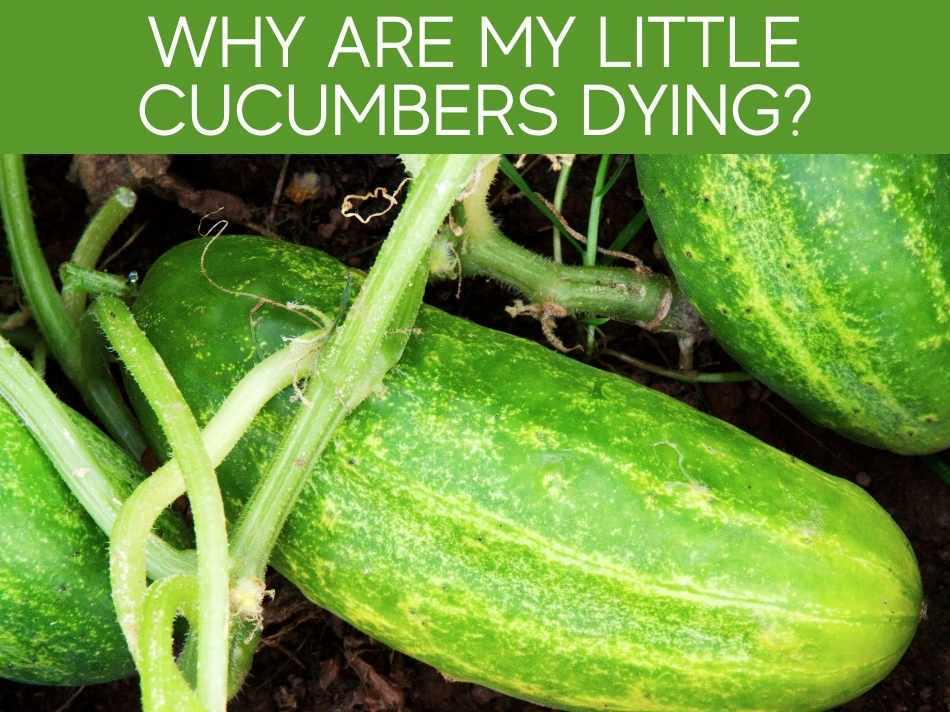
Cucumbers are a summer staple in most vegetable gardens, and for good reason!
They are delicious and have a reputation for being abundant and easy to grow.
But why do our little cucumbers sometimes struggle or die?
Cucumbers dying is most often caused by over-watering, even though cucumber plants require 1-2 inches of water per week. Other causes for cucumber dying are: disease or insects (most commonly cucumber beetles).
Cucumber watering
Cucumbers need soil that drains well and that doesn’t have too much clay.
As with most plants, they need soil that is rich in moisture. But they’ll suffer if their roots are sitting in excessive moisture.
Your soil should always feel slightly moist, but it should not be muddy or dry.
To test your moisture, when you put your finger in the soil it should feel moist about 2-3 inches down (about your second knuckle).
If you find that your soil is drying out too much before you water them next, adjust your watering routine to include more waterings per week and/or increase the amount you water them each time.
Since cucumbers also love the sun and the warmth, sometimes this can cause your soil to dry up too quickly.
Generally cucumbers need about 1-2 inches of water per week, drip irrigation or a soaker hose is best.
Spread mulch around your plants as well to keep the moisture in.
Cucumber pests & disease
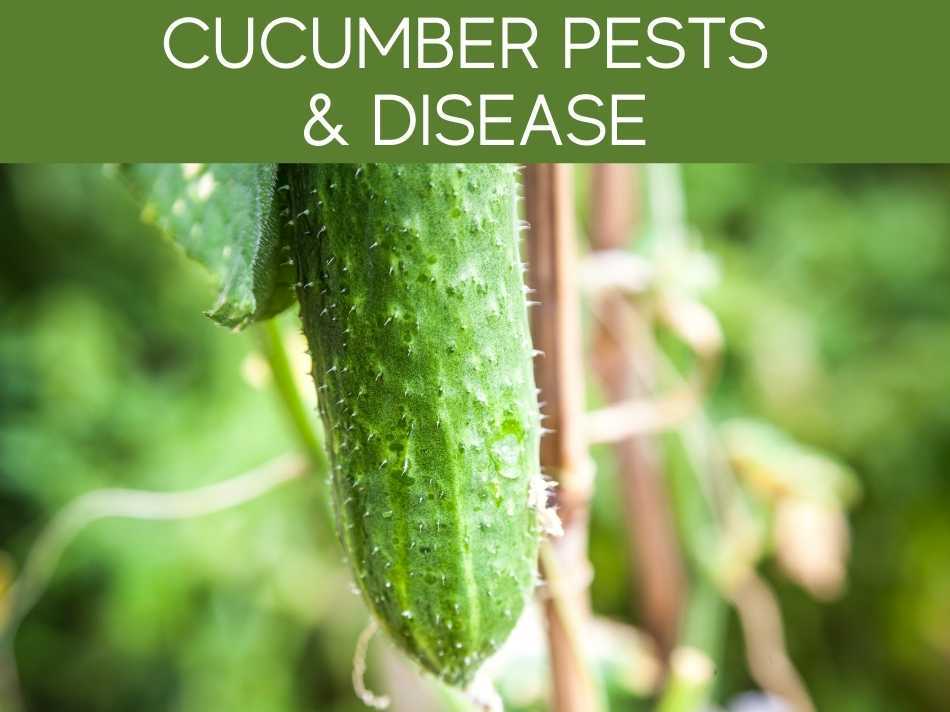
Now, if you know your watering is not the problem, there are a few other potential causes for cucumber problems.
Cucumbers can be the victim of many different diseases, fungus and pests.
It’s important to make sure you are not splashing the leaves of the plant with water. Wet leaves are just asking for trouble!
Keeping your cucumbers in a nice sunny spot will make them very happy, and will quickly dry up any moisture on the leaves if they do get a little wet.
Too much moisture in the soil or on the plant itself is like a big invitation to all sorts of fungus and disease.
Waterlogged plants are not good at growing cucumbers, but they are fantastic at growing fungus.
Most diseases can’t be reversed. Ad you will need to remove any diseased plants quickly so that they don’t infect the surrounding plants.
Another common ailment for your little cucumbers is insects and other garden pests.
Pests, unlike disease, you can generally get a handle on with different pesticides (homemade or store bought).
Insects like cucumber beetles love these juicy little fruits. So you’ll need to keep your eyes peeled for any little critters munching your hard work away!
Insects tend to leave some pretty obvious evidence of their presence.
Usually you can see the insects themselves crawling on your plant or fruits.
But if you can’t see them you will likely find eggs/larvae or evidence that someone has been munching on your leaves!
There are different plants you can grow, such as buckwheat, catnip, and radishes, alongside your cucumber plants that will help draw in beneficial insects who will keep your unwanted cucumber beetles under control.
Other cucumber problems
Depending on the symptoms you are seeing your little cucumbers exhibiting, there could be a variety of reasons they are dying.
So look closely at their leaves, flowers, and the cucumbers themselves.
If the leaves:
- are droopy or the vines are shriveled, it is likely due to underwatering.
- are yellow, wilty and falling off, this is more likely overwatering.
- have strange patterns emerge on the leaves or cucumbers, it’s likely some sort of a disease or fungus.
See the 6 stages if the life cycle of cucumbers, & why they’re important.
Why Are My Cucumbers Turning Yellow and Dying?
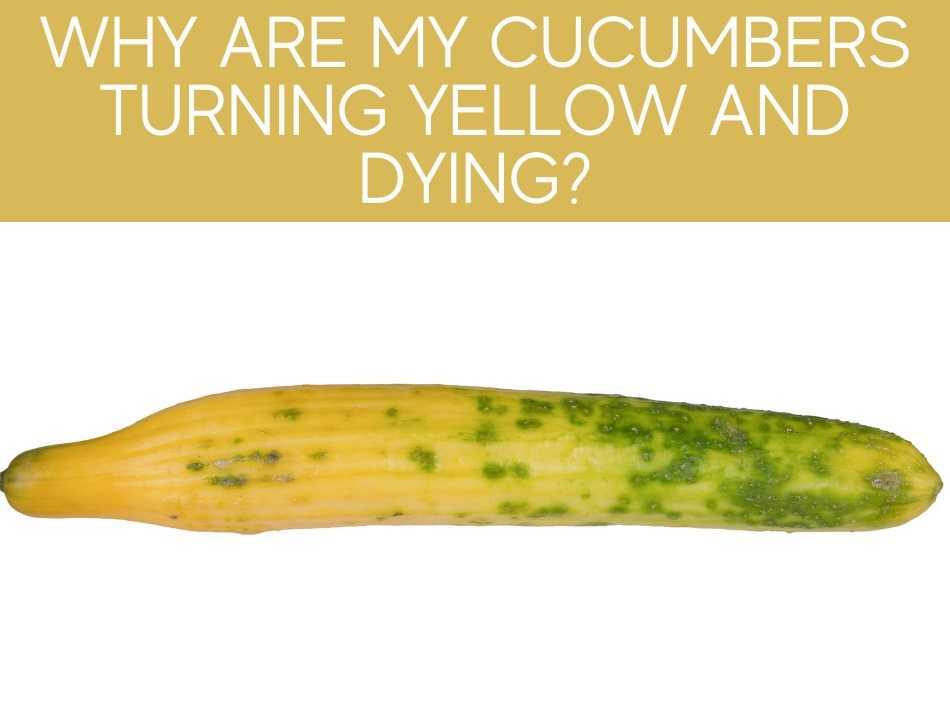
Cucumbers are one of the most beloved summer vegetables (or fruit, depending on how technical you want to get).
So why are my cucumbers turning yellow?
Cucumbers may turn yellow due to being over ripe, over watered, or because of a nutrient deficiency.
A common mistake made with growing cucumbers is not harvesting them in time, since cucumbers don’t give many obvious signs that they are ready to be picked.
Cucumber plants only take about 50-70 days from the time they are planted, to produce harvest ready fruit.
If you wait too long to pick your cucumbers they will turn yellow and bitter, and won’t taste very good in your salad.
Your cucumber is ready to be picked when it is a bright medium green colour and is nice and firm.
A yellow cucumber could also be the sign of overwatering.
If you overwater your cucumber plants, not only do they become waterlogged and can suffer from root-rot, but the excess water can wash away important nutrients from the soil.
Why Do Some Cucumbers Die on the Vine?
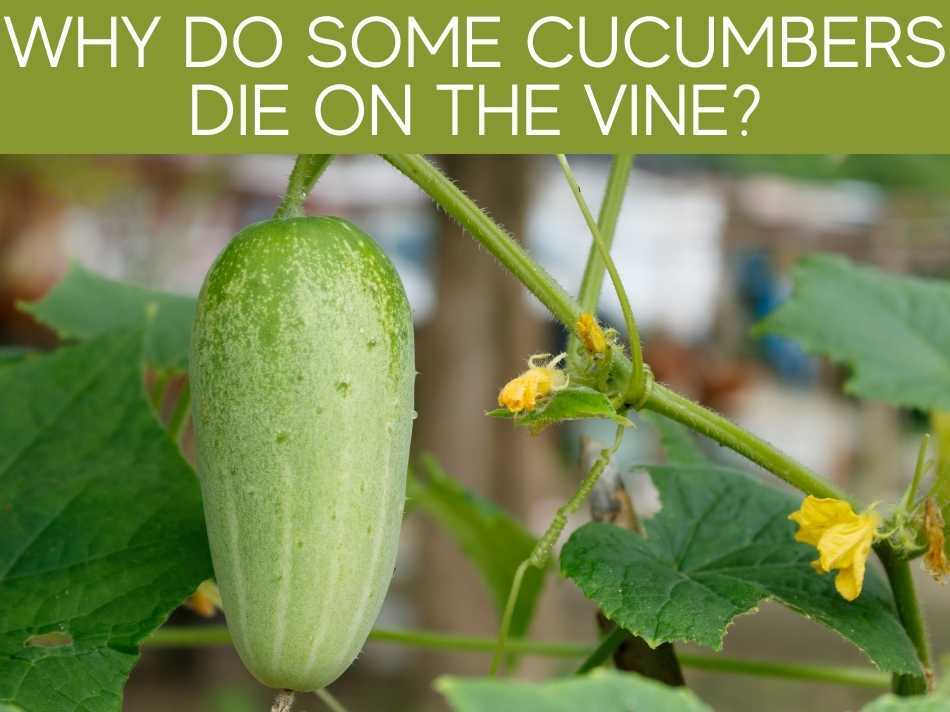
There is not much more disappointing than see your cucumbers grow and mature, and then suddenly die on the vine
The most likely culprit for cucumbers to die on the vine is disease, and most commonly a disease called bacterial wilt.
Bacterial wilt will cause your cucumbers and vines to suddenly wither and die.
Bacterial wilt is spread by cucumber beetles, which is another reason you need to stay on top of pest control.
If you discover that you have a plant infected with bacterial wilt, there unfortunately isn’t anything you can do to cure it.
Remove the infected plant(s), and use insecticides on surrounding plants to try and stop the spread of the disease.
Check out our full article on how long it takes cucumbers to grow.
Why Are My Cucumber Seedlings Dying?
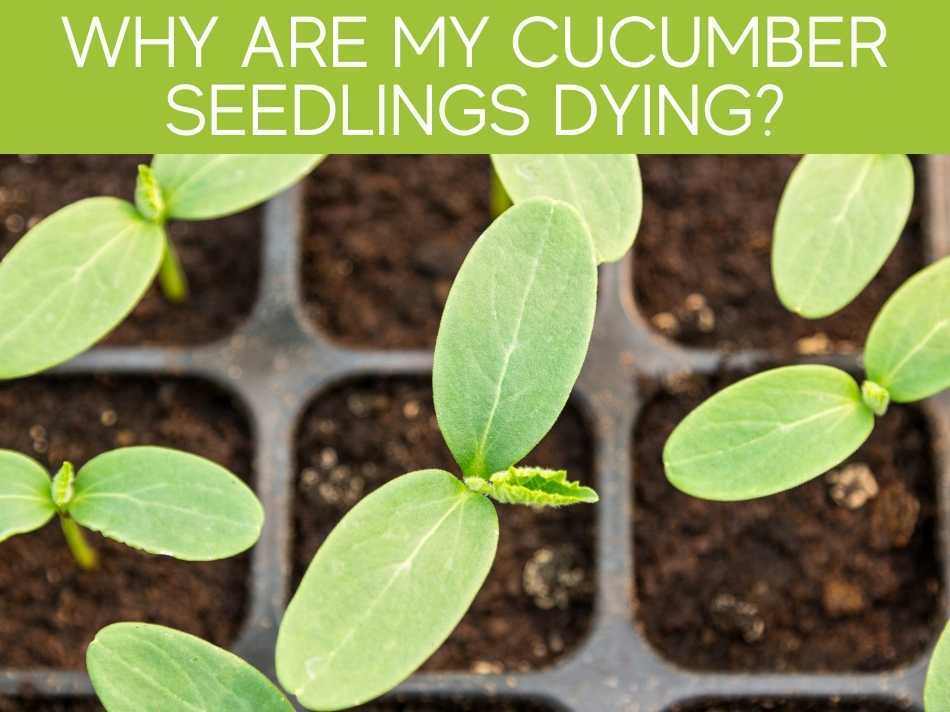
Cucumbers have many great qualities, but being resilient to change is not one of them.
If your cucumber seedlings are dying, it is probably due to transplant shock.
If you started your cucumbers indoors in pots, and then upon transplanting the seedlings to your garden they quickly died, you are not alone.
Cucumbers are very sensitive to being handled, and will often die if you transplant them.
Although it is possible to successfully transplant cucumber seedlings, it really isn’t necessary.
Cucumbers are fast growers, so unless you live somewhere where the season is extremely short, you should have no problem sowing the seeds outside.
Just remember that cucumbers are sensitive little guys, so wait until the temperature is consistently over 70℉ to plant.
If you’re also growing tomatoes, see our complete article on how far apart to plant cucumbers & tomatoes.
Why Do My Baby Cucumbers Keep Dying?
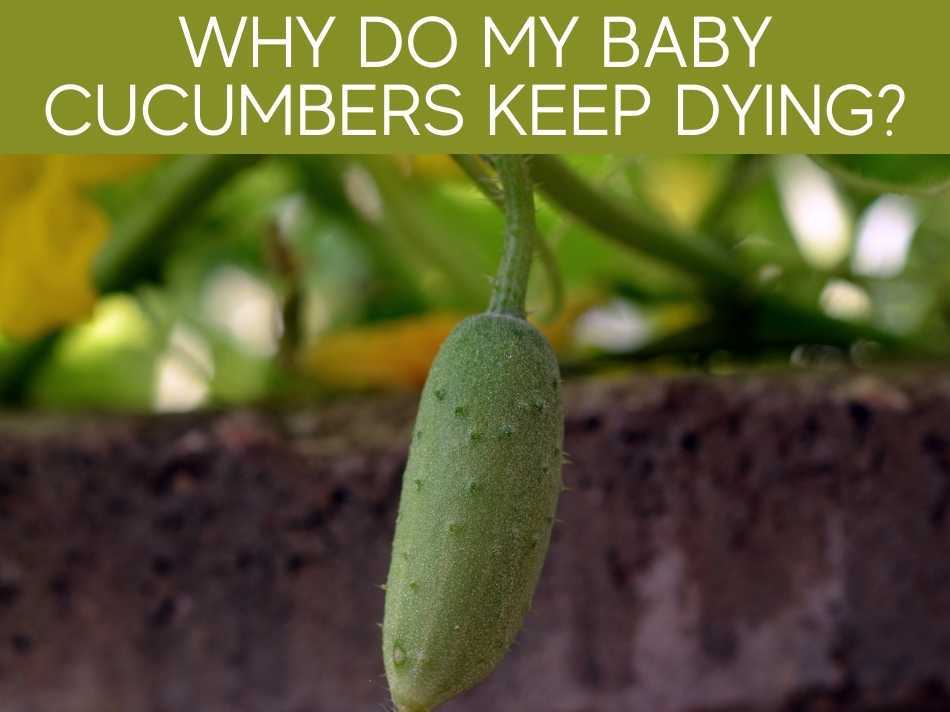
When your cucumber plant starts flowering, and you notice little baby cucumbers you will likely be excited and proud of your healthy little plant!
But then suddenly those little babies start dying, and you will start to wonder what went wrong.
The most likely reason for this, is that your cucumber plants aren’t properly pollinated.
There are different species of cucumber plants, but most require a male and female to be planted together in order to produce fruit.
The female plants are the ones who produce the cucumber, so if you are seeing small fruit at the base of the flowers on your plant, you have a female!
But if there is not a male plant, or that male plant is not pollinating the female by means of bees or other pollinators, the female’s small fruit will not grow and will eventually die.
Figure out if you have both male and female plants, and keep an eye out for pollinators in your garden!
If you have a male and a female, but are just lacking some bees to do the exchange, you can manually pollinate your female plants.
Why Are My Lemon Cucumbers Dying?
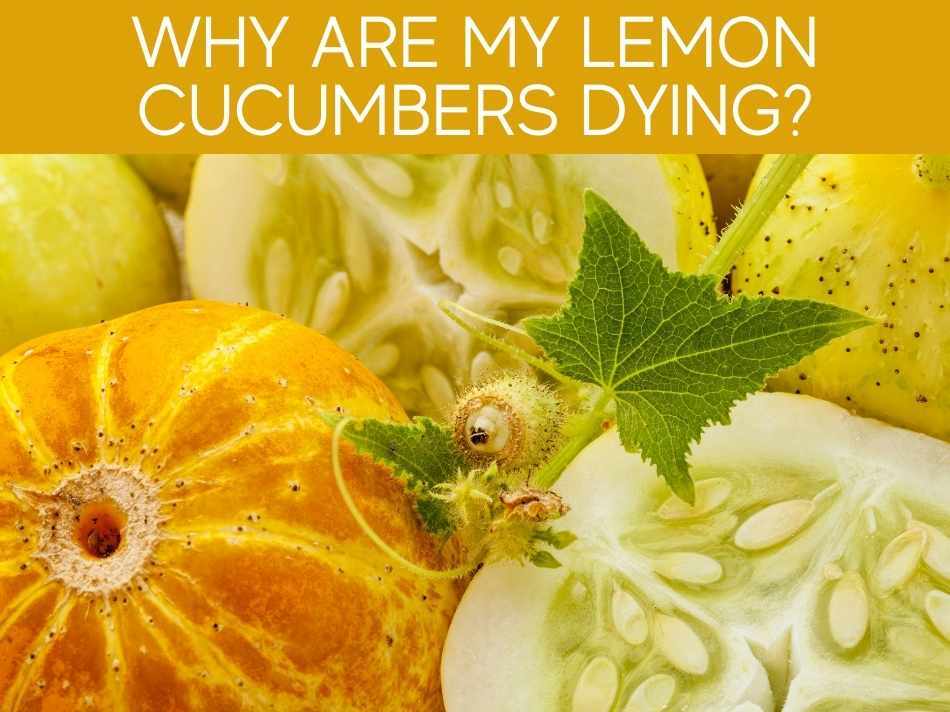
Lemon cucumbers are awesome little plants, because they self-pollinate!
So when looking at why your lemon cucumbers are dying, you can rule out pollination as the issue.
Most likely your lemon cucumbers are dying due to watering issues, disease or insects.
Your lemon cucumbers need about 1-2 inches of water per week.
If they are wilty or yellowing you are likely overwatering your plants!
If the leaves are droopy and your cucumbers are shrivelling, you are likely not watering them enough.
Lemon cucumbers, as with most cucurbits, are also quite susceptible to bacterial wilt.
Bacterial wilt is spread from cucumber beetles. And once a plant is infected you need to discard it immediately and get rid of the beetles to save your other plants.
It is most beneficial to your lemon cucumbers if you prevent bacterial wilt before it happens!
You can plant things such as radishes, buckwheat and catnip will attract beneficial insects to your garden which will help to control the cucumber beetles.
You can also use insecticides to keep your cucumbers protected.
Why Are My Cucumber Leaves Dying?
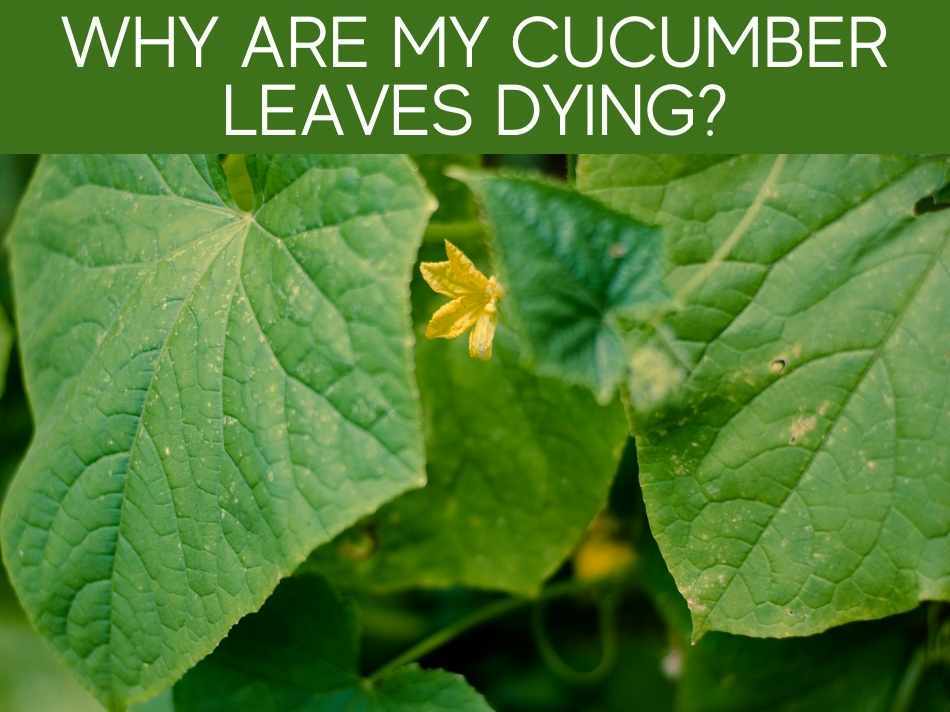
They say our eyes are the windows to our soul; similarly, leaves are the windows to our plants inner workings.
Depending on the symptoms of the leaves, your cucumber may be suffering from bacterial wilt, powdery mildew or being over/underwatered.
Bacterial wilt is common amongst cucurbits (cucumbers, melons and squash), because it is spread by the cucumber beetle.
This annoying disease spreads quickly through your plant, causing it to seem healthy one day and be wilting and dying the next.
Powdery mildew is another common cucumber ailment, and you will be able to recognize it by just looking at the leaves!
Powdery mildew will start as a powdery white spot on the leaves. But it can also spread across the plant eventually turning from white spots to brown dying leaves.
Listen to what the leaves are telling you!
Why Are My Baby Cucumbers Turning Yellow?
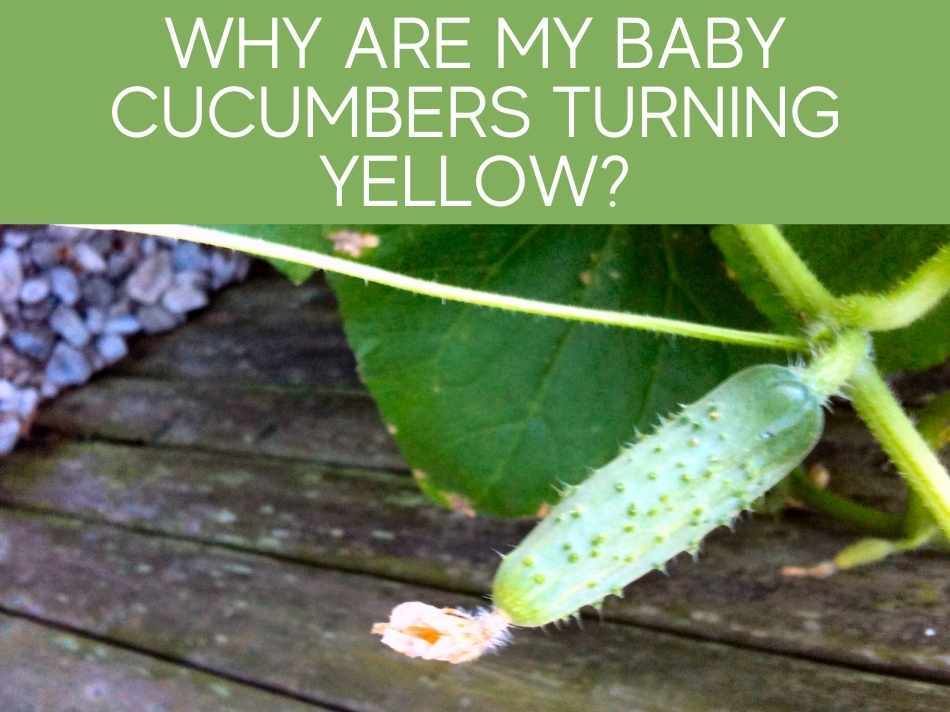
If your baby cucumbers are turning yellow, you may be confused.
Yellow cucumbers are usually due to being overripe, so why are immature fruit turning yellow?
If your baby cucumbers are turning yellow it is likely a problem with pollination.
Most cucumber species need male and female plants present, and pollinators (such as bees) to transfer the pollen from the males to the females.
If your plants are not being pollinated the fruit will not mature.
If you’ve used insecticides without considering how/when to use them so as to not disrupt pollinators, they may have decided not to pay your garden any more visits!
Cucumber pollen is a sticky sort of pollen, so the wind unfortunately cannot do this work for you!
It is possible to manually pollinate your plants, so if you think that pollination is your problem you can help your plants yourself!
Collect pollen from the male plant with a fanned paintbrush, and brush the female flowers gently.
You might also want to check out our full article on how to grow burpless bush cucumbers.
How To Help Dying Cucumber Plants
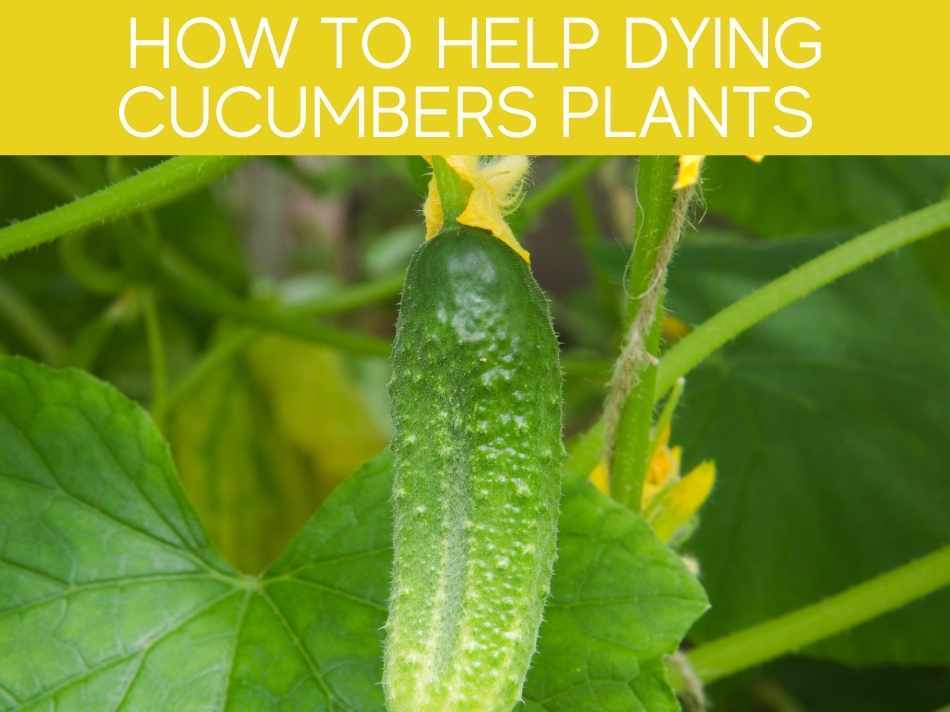
Cucumbers are a summer garden must-have. And once you know how to prevent and treat some common problems they are easy and fun to grow!
If your cucumber plants are dying the first thing to evaluate is your watering routine.
Cucumbers generally need about 1-2 inches of water per week.
You can test your soil’s moisture with a soil meter.
Or simply insert your finger into the soil between waterings, and the soil should always be slightly damp up to your second knuckle.
Using drip irrigation or a soaker hose is the best way to water your cucumbers to limit the amount of moisture that gets onto the foliage.
If your plant is dying due to disease you will need to rid your garden of all infected plants and pests.
The best way to survive disease is to prevent it!
The most common deadly disease to cucumber plants is bacterial rot, and this can be prevented by preventing cucumber beetles!
Cucumber beetles can be managed with insecticides, or by planting buckwheat and catnip to attract other little critters that will eat the cucumber beetles.
Cucumber growing is easy and rewarding, just keep an eye out for those pesky cucumber beetles!
